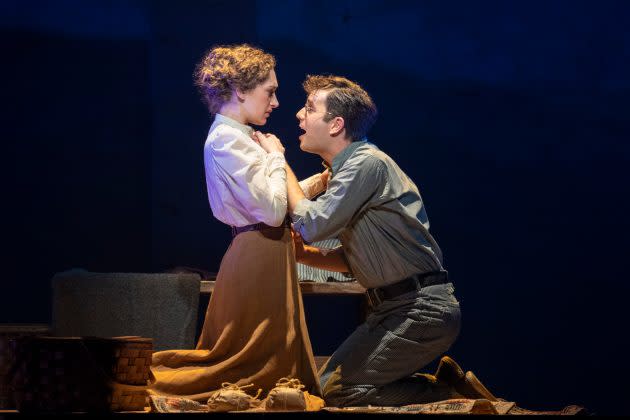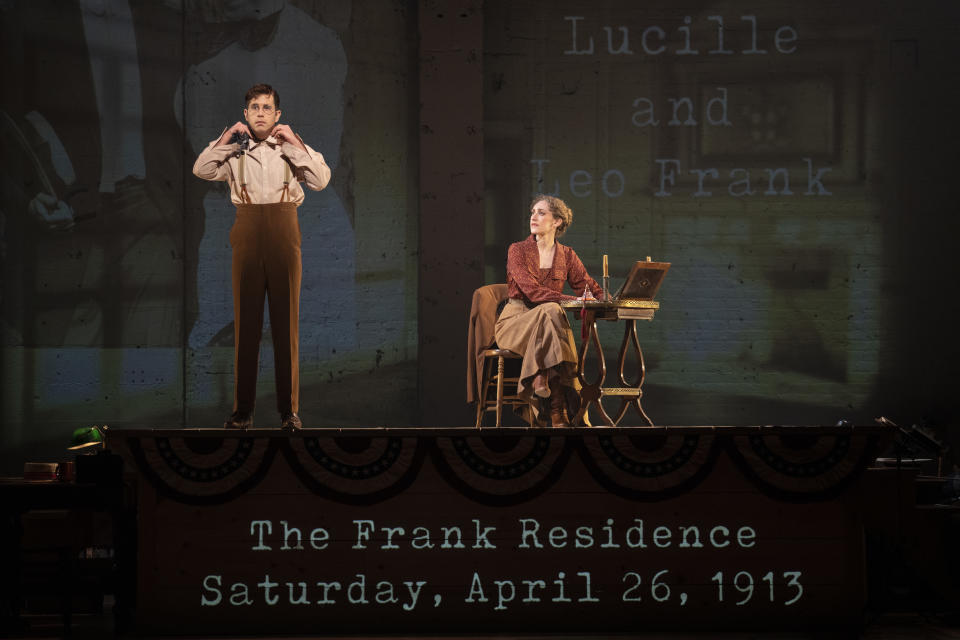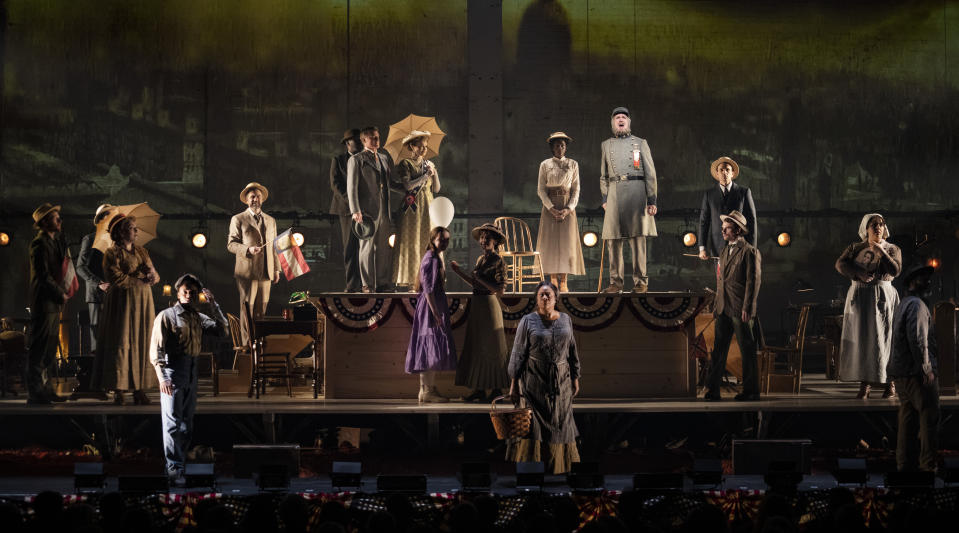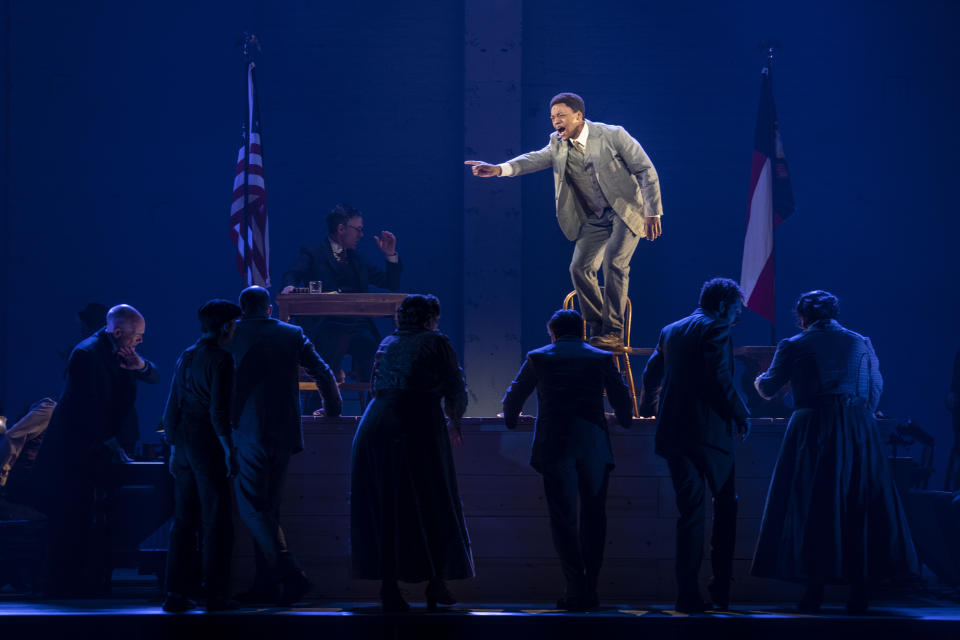‘Parade’ Broadway Review: Ben Platt & Micaela Diamond Lead Exceptional March Through History
- Oops!Something went wrong.Please try again later.
- Oops!Something went wrong.Please try again later.
- Oops!Something went wrong.Please try again later.

Neo-nazis tend to be a noisy bunch, and it takes an extraordinary and confident work of art to drown out their loud, ugly racket. Parade, opening tonight on Broadway at the Bernard B. Jacobs Theatre, is that work of art.
With a serendipitous advertising slogan – “This Is Not Over Yet” – borrowed from one of the most powerful songs from a lovely score, the revival of 1998’s Parade arrives just when it’s needed most, providing an eloquent smackdown response to the rise in antisemitism made all too clear by the hate group protesting outside the show’s first preview (they haven’t been back).
More from Deadline
With a cast as fine as it is large, led by Ben Platt and Micaela Diamond – two of the best singers currently on Broadway – Parade, set in 1913 Georgia, scores its topical points with all the artistry and theatrical know-how to meet and exceed its noble intensions. Parade is as commanding as any musical revival to hit Broadway in years.

Directed by Michael Arden, Parade stars Platt and Diamond as Leo and Lucille Frank, the real-life Jewish couple whose lives were decimated by Leo’s arrest and trumped-up conviction for the rape and murder of 13-year-old Mary Phagan. After his death sentence was commuted to life in prison, the case under a re-evaluation that continues to this day – even auto magnate and consummate antisemite Henry Ford doubted the guilty verdict – Frank was dragged by a lynch mob from his prison cell and hanged from a tree branch.
Not exactly the usual stuff of a Broadway musical, huh? Yet book writer Alfred Uhry and composer Jason Robert Brown delivered a musical (co-conceived and originally directed by Harold Prince) that was as engaging as it was poignant, offsetting the broader scope of a history lesson with a marriage story that’s convincing in its complexity and heartbreaking in its conclusion.
But even with the head-start of solid source material, every production of Parade has to contend with some inherent stumbling blocks. Move too slow and the story becomes ponderous. Cast the wrong performers, even in supporting roles (maybe especially in supporting roles) and the balance of delicate power dynamics crumbles. Less than stellar singers, and there goes a score that can soar.
Arden, Platt and Diamond see to it that this revival sails over those landmines. Along with a 33-person cast that includes such stand-outs as, to cherry-pick a few, Alex Joseph Grayson (as a lying, arm-twisted ex-con witness), Jay Armstrong Johnson (as an unscrupulous reporter) and Danielle Lee Greaves (as the Franks’ servant bullied into betrayal) – this Parade, which began as an Encores! presentation at the on-a-roll New York City Center (originator of Broadway’s recent Into the Woods), is very likely as good an interpretation of the Uhry-Brown work as most of us will ever see.

Performed on a set designed by Dane Laffrey and built around a raised, boxy, center-stage platform that calls to mind witness stands, boxing rings, wooden gallows and old-timey bandstands, Parade glides by as the action moves from home to pencil factory, chain gang roadside to governor’s mansion, each location change announcing itself via unsettling, often eerie historical photographs projected against a back wall. Characters are introduced the same way, with black-and-white visages reminding us that the people we see singing and dancing once really and truly walked this earth.
Most audience members will likely know the broad historical outlines of the story that begins in 1913, when Leo Frank, a Brooklyn-raised Jew transplanted to Marietta, Georgia, to work in a pencil factory, was accused of young Mary’s horrific murder. The girl, an assembly line worker at 13, was found dead in the factory’s basement hours after she was seen visiting Frank’s office to pick up her paycheck.
Uhry’s book, without tipping its hand too blatantly, introduces us to Leo and wife Lucille hours before the crime, their bickering about his working on the “Confederate Memorial Day” holiday and its celebratory parade pointing up the bedrock differences in their world views as Jews born and raised on opposite sides of the Mason-Dixon Line.
“Confederate Memorial Day is asinine,” he tells her. “Why would anyone want to celebrate losing a war?” Given that we’ve just seen a brief, musical preamble flashback to a young Confederate soldier parting with his hometown girl – the Stephen Foster-esque number “The Old Red Hills of Home,” well sung by Charlie Webb, just one of the many ensemble players given a moment to shine – we know immediately that Leo’s fish-out-of-water opinions will bring him nothing good.
Young Mary (Erin Rose Doyle) is also introduced early on, dressed in her new holiday-picnic dress and holding tight to a white, helium-filled ballon as she exchanges mildly flirtatious small talk with a goofy local boy (Jake Pedersen) for a movie date we know will never happen. Mary’s death will come soon, signified on stage by the release and ascension of that balloon (one of the production’s few slips into a heavy-handedness also evidenced in Platt’s jailed Leo remaining on stage throughout intermission).

Along the way to Leo’s inevitable, tragic and infuriating end, Parade introduces us to a wide and diverse array of personages, including a corrupt prosecutor Hugh Dorsey (Paul Alexander Nolan, as exemplary here as he was in Slave Play), a guilt-ridden governor (Sean Allan Krill, even stronger than he was in Jagged Little Pill), a racist judge (Howard McGillin), an antisemitic newspaper publisher (Manoel Felciano) and the Black servants (Douglas Lyons, Courtnee Carter) who can only marvel, angrily and dejectedly, at all the attention being focused on the hanging of one white man when “there’s a black man swingin’ in every tree.”
That line is from the Act II opening number “Rumblin’ and a Rollin,” just one of this revival’s many beautifully performed songs, from the exhilaratingly bitter “That’s What He Said” to the deceptively sweet “Factory Girls” performed by a trio of Mary’s lying friends.
But make no mistake, Parade belongs to Leo and Lucille. For his part, Platt has no trouble reminding us just why he’s become one of Broadway’s most beloved performers. His vocals here are stunning, soaring high and sinking low in a remarkably flexible, pitch-perfect and bell-toned performance, modulated for every emotional nuance of a score than strikes notes of vaudeville, pop balladry and musical theater showstopper. While Platt’s onscreen performances have been, to date, a bit hit and miss, and if his Leo could stand to evidence a touch more of the wear and tear taken by two years in a Georgia prison, his stage presence, acting chops and singing prowess place him near the top of his generation’s Broadway stars.
Diamond matches Platt step by step and note for note, a delightfully unexpected achievement for a relative newcomer who made her Broadway debut as one of the Chers in the largely forgettable 2018 jukebox musical The Cher Show. The Platt-Diamond duets like “Leo At Work/What Am I Waiting For?”, “All the Wasted Time” and, especially, “This Is Not Over Yet” are knock-outs, their vocals fitting together in ways only hinted at during their outstanding solo numbers (Platt’s “Leo’s Statement: It’s Hard to Speak My Heart”, Diamond’s “You Don’t Know This Man”).
Director Arden and choreographers Lauren Yalango-Grant & Christopher Cree Grant don’t skimp on the big ensemble numbers either, reaching a rousing (and menacing) “Where Will You Stand When the Flood Comes?”
Sure, we know where this mob will stand come the flood, but that knowledge does little to soften the blow when Platt’s Leo, dressed only in the nightshirt he was wearing when abducted (costumer designer Susan Hilferty’s work is top notch throughout), drops to his death in a bit of stagecraft that, while not quite as gasp-inducing as a similar scene in last year’s Hangmen, still packs its punch.
In a brief coda that jumps to the present day, the actors who played that long-ago Confederate soldier and his sweetheart take the stage in modern dress as a young couple happily picnicking on the very site where a plaque marks the spot of Frank’s lynching. It’s a purposely ambiguous scene, perhaps hopeful, more likely not. A projection reminds us that Frank’s case, reopened in 2019, remains officially unresolved.
Title: Parade
Venue: Broadway’s Bernard B. Jacobs Theatre
Director: Michael Arden
Book: Alfred Uhry
Music: Jason Robert Brown
Cast: Ben Platt, Micaela Diamond, Alex Joseph Grayson, Sean Allan Krill, Howard McGillin, Paul Alexander Nolan, Jay Armstrong Johnson, Kelli Barrett, Courtnee Carter, Eddie Cooper, Erin Rose Doyle, Tony Award nominee Manoel Felciano, Danielle Lee Greaves, Douglas Lyons, Jake Pedersen, Florrie Bagel, Stacie Bono, Max Chernin, Emily Rose DeMartino, Christopher Gurr, Beth Kirkpatrick, Ashlyn Maddox, Sophia Manicone, William Michals, Jackson Teeley, Charlie Webb.
Running time: 2 hr 30 min (including intermission)
Best of Deadline
Sign up for Deadline's Newsletter. For the latest news, follow us on Facebook, Twitter, and Instagram.

